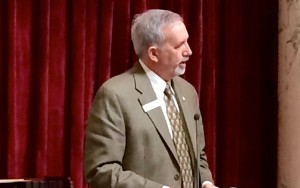It took about a half an hour for the Senate to spend nearly $1.48 million on public schools.

Without a hint of dissent — and with scarcely any debate — the Senate approved all seven pieces of the K-12 budget on identical 35-0 votes.
The process went so smoothly that the Senate used a procedural time-saving technique known as “rolling” votes. Instead of reading a senator-by-senator roll call, lawmakers agreed to bypass this process and approve the budgets unanimously.
“I don’t ever recall having rolled through public school budgets in this manner,” said longtime Senate Finance Committee Chairman Dean Cameron. “These are historic appropriations as we move forward in public education.”

The lone hiccup in the process came when Senate Education Committee Chairman Dean Mortimer jumped the gun and mistakenly debated for a spending bill that wasn’t up for consideration.
The spending bills would boost general fund spending for schools by 7.4 percent, a $101.2 million increase. That mirrors the spending increase originally requested on Jan. 12 by Gov. Butch Otter. The bills include several familiar components discussed throughout the 2015 session:
- A $33.5 million line item for phase one of the teacher career ladder — a five-year plan to boost teacher pay by $125 million. The ladder would boost pay for veteran and starting teachers; for example, the minimum teacher salary would increase from $31,750 to $32,700.
- A $33.2 million boost in operations funding. Also known as “discretionary spending,” this money is used to cover a range of district needs, from teaching positions to employee benefits to transportation and utilities. Per-classroom operational spending would increase from $22,401 to $23,868, a number that still lags behind 2008-09 levels of $25,696.
- A $2.1 million line item for school Wi-Fi.
- Reduced funding for the ailing Schoolnet instructional management system — the subject of increased legislative scrutiny and a critical state audit report. The budget drops from $2.5 million to $985,000 in one-time funding, while districts will receive increased funding to shop for their own systems.
The Senate’s rapid-fire budget approvals move the seven bills to the House.
While the education bills represent some of the biggest pieces of unfinished business facing the 2015 Legislature, an adjournment date remains unclear. Both the Senate and House adjourned for the day before noon and are planning limited sessions the rest of the week. Leaders of both houses expect to be in session Monday, for what would be the start of the 13th week of the session.
The Senate and House remain at odds over tax and transportation funding issues. This impasse went unaddressed Wednesday — at least in open session.
In other Statehouse action Wednesday:
Broadband funding. Without debate, the House quickly passed the budget for Superintendent of Public Instruction Sherri Ybarra’s office.

The $39.2 million budget is separate from the public schools budgets, but is noteworthy because it now includes $6.3 million in funding to reimburse school districts for local broadband Internet service for the 2015-16 school year.
The Department of Administration previously oversaw the broadband program, but legislators transferred that authority to Ybarra’s office after District Judge Patrick Owen voided the Idaho Education Network contract.
The budget for Ybarra’s office includes:
- $6.3 million to reimburse local school districts for broadband.
- $734,800 in one-time funding to hire five staffers to distribute broadband funding to districts and provide technical support.
- $94,300 to hire a purchasing and contracts manager who will conduct internal reviews of the department’s contracting and procurement procedures.
- Funding for 3 percent raises for employees.
The new budget for Ybarra’s office includes a 14.3 percent increase above current funding levels because of the added expenses of transferring authority of the broadband program to that office. The Department of Administration is also seeing its budget cut for the same reason.
Representatives voted 62-7 to approve the superintendent’s budget, with opposition coming from House Republicans who did not explain their reasons for voting against the budget.
This budget cleared the Senate 34-0 last month, and heads next to Otter’s desk for final consideration.
Coming Thursday:
Teacher salaries. Gov. Butch Otter’s press secretary Jon Hanian confirmed to Idaho Ed News that the governor will sign the $125.5 million career ladder teacher salary bill.
Months in the making, the House and Senate overwhelmingly passed the career ladder last week after two earlier versions of the proposal essentially died in a House committee.
Otter will sign the career ladder into law during ceremonies set for 9 a.m. in his Statehouse office, Hanian said. The House and Senate have pushed back their morning schedules to 10 a.m. to allow legislators to attend the public ceremony.
Check back with Idaho Education News on Thursday morning for full coverage of the career ladder ceremony and reaction.
